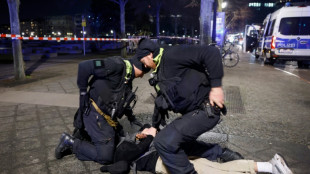

German anti-fascist activist on trial in Hungary over alleged assault
A German anti-fascist activist accused of allegedly participating in violent attacks against neo-Nazis went on trial on Friday in Hungary, as nationalist premier Viktor Orban has vowed to clamp down on "far-left violence".
During a preliminary hearing, the 24-year-old activist -- who identifies as non-binary -- was led into a Budapest court room handcuffed and with feet shackled.
The defendant, known as Maja T., is accused of four counts of attempted assault against far-right activists in February 2023.
According to a court statement, the accused acted as part of a criminal organisation that "inflicted various life-threatening injuries" on the presumed neo-Nazis.
Maja T. was handed over to Hungary last summer, a decision that was severely criticised by a German constitutional court earlier this month, which said it had failed to take into account potentially dangerous prison conditions in Hungary, especially for LGBTQ people.
"I am accused in a country, where I do not exist as Maja," said the defendant in front of a packed courtroom, denouncing human rights violations in Hungary.
According to the local news website Index, the German national complained about being placed in solitary confinement in a cell infested with cockroaches and bedbugs.
Outside the court house, some anti-fascist protesters gathered to demand the defendant's release while chanting "Free Maja!" and holding up banners.
- Dangerous prison conditions -
Maja T. was arrested in Germany in 2023 and handed over to Hungarian authorities after a regional court in Berlin greenlit the extradition.
But the German constitutional court in Karlsruhe said judges had not appropriately considered the conditions in Hungary's prisons -- including "overcrowding" -- and statements by Hungarian authorities were not "sufficient to rule out" torture and inhumane treatment.
The 2023 attacks happened in the days preceding the so-called annual "Day of Honour" commemoration in Budapest, where European far-right groups gather to mark a failed attempt by Nazi forces in 1945 to break out of the city during the Soviet army's siege.
Several activists have since been prosecuted in Hungary and could face prison sentences for the violence.
One of them, Ilaria Salis, an Italian teacher, made international headlines when she appeared in a Budapest court in 2024, with her feet shackled.
She has since been released from house arrest due to the immunity she obtained following her election to the EU parliament.
Six people suspected of participating in the attacks in Budapest turned themselves in in Germany in a bid to avoid extradition to Hungary, their lawyers said.
A second defendant in Maja T.'s case, an Italian activist named Gabriele Marchesi, was freed from prison after a Milanese court found there are risks of "inhumane and degrading treatment" in Hungarian prisons, according to Italian media reports.
袁-J.Pān--THT-士蔑報




